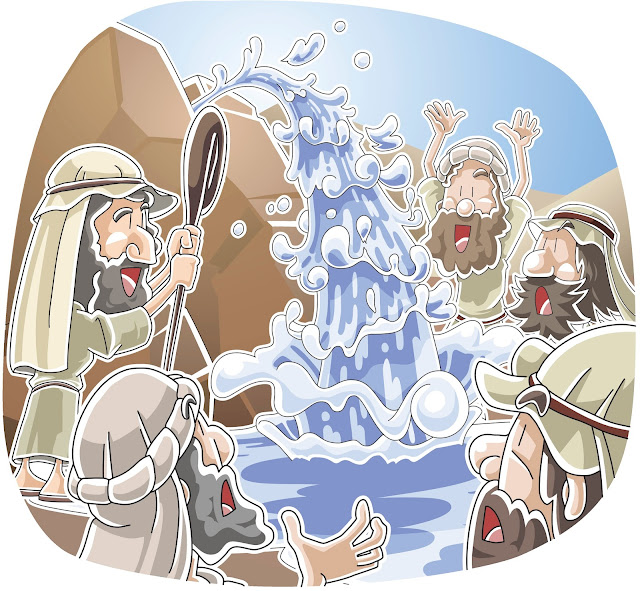But Moses said to the people, "Do not fear! Stand by and see the salvation of the LORD which He will accomplish for you today; for the Egyptians whom you have seen today, you will never see them again forever. The LORD will fight for you while you keep silent."
(Exodus 14:13-14)
Salvation is wholly a work of God from beginning to end. The fact that you can contribute nothing to your salvation is a stumbling block to non-believers and believers alike. Pride can keep people from humbling themselves before God and receiving the gift of salvation. Those who have received salvation can begin to think they must now add something to what they have received.
Both are serious errors.
The Apostle Paul used the exodus and wilderness wanderings of the sons of Israel as a picture of God's work of salvation.
For I do not want you to be unaware, brethren, that our fathers were all under the cloud and all passed through the sea; and all were baptized into Moses in the cloud and in the sea; and all ate the same spiritual food; and all drank the same spiritual drink, for they were drinking from a spiritual rock which followed them; and the rock was Christ. (1 Corinthians 10:1-4)
To fully understand this you should read Exodus, Leviticus, Numbers, and Deuteronomy in their entirety. This brief study will not be able to delve into every nuance. We are attempting a big picture overview.
As God brought His people out of Egypt and into the Promised Land, we see that their formation, deliverance, sustenance, and receiving of the promises were all a work of God's mighty power. Those who were faithless perished along the way. Their faithlessness is a stark warning for New Covenant believers:
As God brought His people out of Egypt and into the Promised Land, we see that their formation, deliverance, sustenance, and receiving of the promises were all a work of God's mighty power. Those who were faithless perished along the way. Their faithlessness is a stark warning for New Covenant believers:
Nevertheless, with most of them God was not well-pleased; for they were laid low in the wilderness. Now these things happened as examples for us, so that we would not crave evil things as they also craved. (1 Corinthians 10:5-6, underline added)
To learn from this example we must understand two things:
- Salvation is wholly a work of God from beginning to end; and
- The longing of God's people should not be for evil things but instead for God to be glorified in and through the work of salvation.
Baptized in the Cloud and in the Sea
The judgments leading up to the exodus were intended to bring God's people out of Egypt so they could be a people holy unto Him. Through this holy nation God would bring a Savior and King who will rule the nations and bless all the families of the earth.As God was leading His people, He led them by manifesting Himself as a pillar of cloud by day and a pillar of fire by night. God's people followed their God out of Egypt. They followed Him up to the sea. For four hundred thirty years the sons of Israel had served as slaves in Egypt. They were laborers, not warriors. They were a group of men, women, and children.
As they stood on the shore of the sea the Egyptian army came bearing down on them. They were in a situation that appeared hopeless. Despite recently experiencing God's protection while still in Egypt, they were frightened. They cried out to the Lord and Moses.
Then they said to Moses, "Is it because there were no graves in Egypt that you have taken us away to die in the wilderness? Why have you dealt with us in this way, bringing us out of Egypt? Is this not the word that we spoke to you in Egypt, saying, 'Leave us alone that we may serve the Egyptians '? For it would have been better for us to serve the Egyptians than to die in the wilderness." (Exodus 14:11-12)In this moment, the sons of Israel saw their helpless and hopeless state. They had nothing to contribute to their deliverance. Moses declared to them that their salvation was going to be a work of God.
But Moses said to the people, "Do not fear! Stand by and see the salvation of the LORD which He will accomplish for you today; for the Egyptians whom you have seen today, you will never see them again forever. The LORD will fight for you while you keep silent." (Exodus 14:13-14)God commanded Moses to stretch out his hand over the sea. When Moses obeyed, God worked through Moses to divide the sea so that the company of Israel could walk through on dry land. Then God brought the waters back together upon the Egyptians who had tried to follow.
Moses did not deliver the people. God did. God chose to have Moses participate. Moses contributed nothing of value. He simply obeyed God's command and God worked through his obedience. Moses had no power in himself to divide the sea or to bring it back together. His only hope was that God would do as He had promised when he walked with God in faith. Had God not done what He promised the sons of Israel would have perished on the seashore.
The Spiritual Rock
The Apostle didn't end with the deliverance through the sea. Paul continued to include the sustenance of the people through the wilderness in his picture of God's continued work of salvation.The people needed food and water in the wilderness. God provided. They needed God's continual provision. So do we.
The people could not work for these things. They had to receive them as they were provided. When they attempted to gather more manna than they were commanded it rotted. When Moses added himself to the miraculous deliverance of water he was disqualified from entering into the Promised Land.
So Moses took the rod from before the LORD, just as He had commanded him; and Moses and Aaron gathered the assembly before the rock. And he said to them, "Listen now, you rebels; shall we bring forth water for you out of this rock?" Then Moses lifted up his hand and struck the rock twice with his rod; and water came forth abundantly, and the congregation and their beasts drank. But the LORD said to Moses and Aaron, "Because you have not believed Me, to treat Me as holy in the sight of the sons of Israel, therefore you shall not bring this assembly into the land which I have given them." (Numbers 20:9-12)Moses began by obeying God. Moses had been a faithful instrument in God's hand. Yet, his obedience faltered and he disobeyed God in this instance. Moses failed to treat God as holy. Moses added something of himself into the equation. God told Moses to bring forth water by speaking to the rock, not by striking it.
Moses attempted to bring forth God's intended results through his own means. God still used Moses in his disobedience and brought forth the water the people needed. Yet, Moses himself was disqualified and not allowed to enter into the land.
The analogy can easily be misunderstood. I am not questioning Moses' salvation. Neither Moses nor anyone else is saved by their works. Moses' disqualification from entering the land serves as a warning to everyone that even the most obedient, who falter in such a small way, will not make it on their own.
In Moses' case, he lost out on an earthly blessing. Those who attempt to add anything of themselves to the work of salvation will necessarily ruin the sinlessness and perfect righteousness offered in Christ alone and won't succeed. We begin by the Spirit of God and run the entire course by His grace. Works will follow as the fruit but they add nothing to our salvation other than evidence that it is genuine.
This is the only thing I want to find out from you: did you receive the Spirit by the works of the Law, or by hearing with faith? Are you so foolish? Having begun by the Spirit, are you now being perfected by the flesh? (Galatians 3:2-3)Paul continues in Galatians 3 to emphasize that our salvation, if it is genuinely from God, will begin and be completed by the Spirit of God. As we walk in faith works will result. They do not save us. The grace of God saves us. If no works are evident it is likely you have not been saved and that your faith is a dead faith (cf. James 2:14-26; Matthew 7:16-29; etc.).
Conclusion
Salvation is accomplished by the grace of God. It is not the work of people. Salvation is received through faith. While obedience to God is clearly commanded in the Scriptures we must never make the mistake of thinking that our obedience contributes to the work of salvation. God works in and through His people in both their obedience and their disobedience.While the Bible consistently encourages God's children to obey Him, we must not make the mistake of concluding that our obedience adds to the salvation God provides through Christ alone. When we attempt to add to what God has done we can, like Moses, attempt to steal glory from God.
From beginning to end salvation is wholly a work of God. It must be received as a gift by faith. In faith, we must be sure to never attempt to add to it or take away from it. In faith, we must always treat our God - who loved us and sent His Son to accomplish our salvation and keep us until the end - as holy.
Attempting to add anything to our salvation is a craving for evil as it is an attempt to steal glory from God. All who enter into God's presence in the company of the redeemed will be a reason to boast in God, not in themselves.
For by grace you have been saved through faith; and that not of yourselves, it is the gift of God; not as a result of works, so that no one may boast. (Ephesians 2:8-9)When we humbly walk in faith and obey our God, we have opportunity to stand by and see how He works in and through us. That creates many opportunities to boast in the Lord.
The truth is, from the greatest to the least of us, we all need God's grace every moment of every day. Just like the sons of Israel needed God to provide for them every step of the way out of Egypt into the Promised Land we must depend on God for everything. If we think we only need Him for some, or even most, we are woefully deceived.
May God be treated as holy among His people.
But may it never be that I would boast, except in the cross of our Lord Jesus Christ, through which the world has been crucified to me, and I to the world. (Galatians 6:14)




Comments